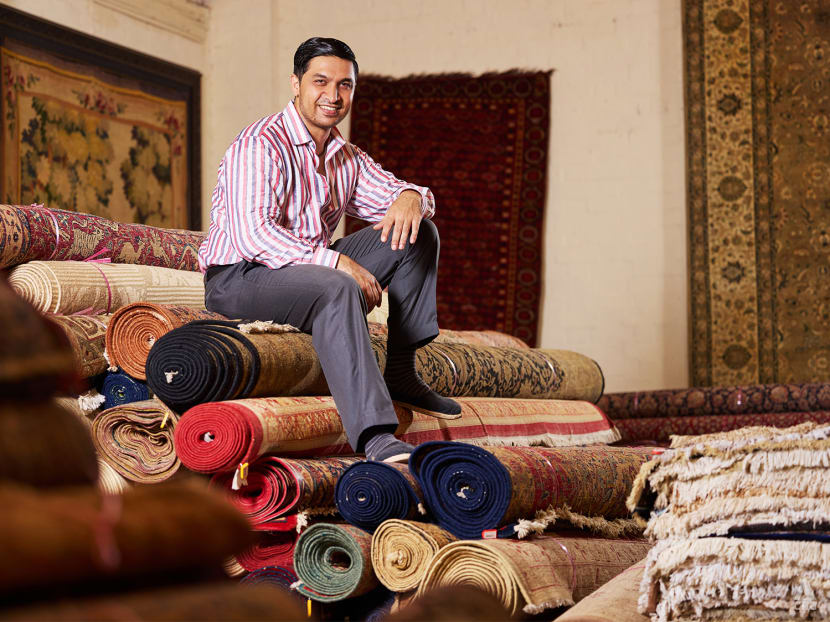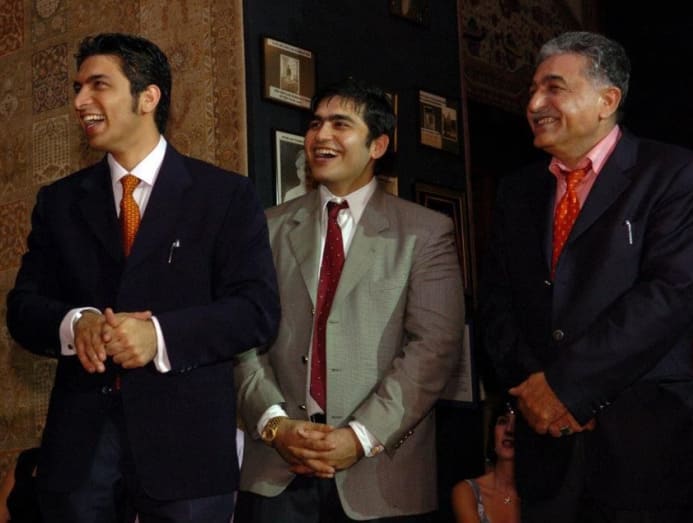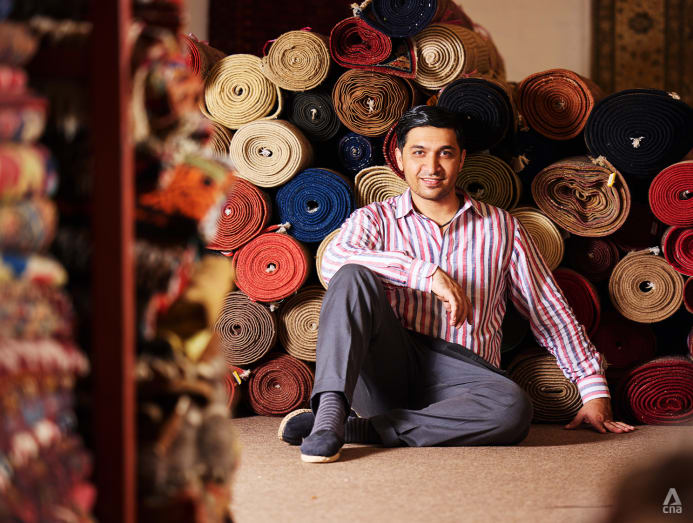Meet Imran Abid Mir, a sixth-generation carpet merchant and head of Lotto Carpets Gallery
Imran Abid Mir, principal of Lotto Carpets Gallery, took the helm of the family business following the sudden passing of his father in 2023. Today, he is committed to carrying forward the Mir family’s dedication of sharing the art and heritage of carpet-making.

Imran Abid Mir, head of Lotto Carpets Gallery, is on a mission to reintroduce carpets as a work of art, rather than just a floor covering. (Photo: CNA/Kelvin Chia)

This audio is generated by an AI tool.
Imran Abid Mir does not want to be known as a carpet dealer. “We prefer to call ourselves carpet merchants," the 38-year-old stated. "The reason is simple: We're not here just to sell you carpets. Whether you buy or not is secondary. Our main goal is to share our knowledge," said the principal of Lotto Carpets Gallery.
Imran is a sixth-generation carpet merchant whose family history is intertwined with rugs. Although his paternal grandfather’s side of the family had been in the carpet business for several generations, his father, Abid Mir, started Lotto Carpets on his own from scratch. Abid was raised by his mother in a single-parent household after his father remarried. Call it fate – Abid discovered his family's history in carpets only after he entered the business himself.
Growing up in Lahore, Pakistan, Abid’s journey began humbly. As a teenager, he carried carpets on his back to make ends meet, walking five to 10 kilometres to deliver them to buyers. He earned around S$0.10 to S$0.50 per trip.
Over time, he saved up enough money to travel to Karachi, where he learnt everything there was to know about the intricacies of carpets and the business at a relative’s factory. Later on, he ventured into sourcing carpets directly from manufacturers and supplying them to exporters.

In 1978, he made a bold move to establish a warehouse on London’s renowned Bond Street, supplying carpets throughout Southeast Asia. “He started making friends with dealers and collectors, who told him that Singapore is a great place [for business]. A lot of their friends travelled through Singapore, so why not set up a gallery here instead?” shared Imran. Inspired by these conversations, Lotto Carpets Gallery opened in Singapore in 1981.
The name “Lotto” pays homage to Abid’s favourite type of carpet, the Lotto Ushak, renowned for its intricate lace-like arabesque pattern inspired by the works of Italian painter Lorenzo Lotto. Abid passed away suddenly in 2023. After a short hiatus for the family to cope with the loss, Imran now leads the business, upholding the Mirs’ commitment to sharing their passion for the artistry and history of carpet-making.
A GENERATIONAL LEGACY
It was never in the cards for Imran to follow in his father’s footsteps. “My dad was a genius. For the first 16 years of my life, he told me, son, you can do anything you want in life, but you cannot be a carpet guy,” Imran, the eldest of three children, recounted fondly. Imran’s younger brother and sister currently help with the business on a part-time basis.
We are chatting in Lotto’s by-appointment-only warehouse gallery in Depot Lane, surrounded by piles and piles of carpets – some stacked, others rolled.
On the walls, Lotto’s prized rugs are prominently displayed, each one at least 150 years old. They include a 19th century Persian Neriz Afshar, a 19th century pure silk Iranian Kashan carpet and a Karabagh Caucasian carpet from the late 17th century. The latter is rare and highly collectible. The estimated value of these carpets is between US$200,000 to US$500,000 (S$267,556 to S$668,891), the company said.

Lotto Carpets specialises in curating traditional hand-knotted carpets. It also has a rich collection of antique carpets dating back 200 to 300 years, crafted by tribal artisans. Its carpets are sourced from all over the world, including India, China, Afghanistan, Pakistan and Turkey.
Imran spent much of his time in his youth helping out at Lotto’s former gallery in Dempsey but was never allowed to sell any carpets. “It was reverse psychology,” he said of his father’s hidden agenda.
Once, during his university days, Imran took a break from studying by walking around the shop. He was suddenly captivated by the beauty of a rare 120-year-old Kashmiri carpet and spent the next 45 minutes just staring at it. “I couldn’t go back to studying after that. I went to my dad, who had a very bold expression on his face. He said, okay, the grass cutter’s son will eventually cut grass. He knew it would happen one day where I would join the business,” Imran recalled with a laugh.
His father, however, had an unconventional approach to teaching him about business and leadership. Rather than starting at the family shop, Imran was sent to work on his father's farm back in Pakistan.
“He wanted me to spend some time there and see if I could accomplish something, because dealing with people in Pakistan can be tough,” Imran explained. Nearby, one of his father’s childhood friends coincidentally owned a carpet factory, where Imran gained firsthand experience in the carpet industry. “I’d wake up at 4am, head to the farm, ride horses, and check on the milk production. Then I’d shower and head to the factory,” Imran recounted.

CARPETS AS A WORK OF ART
When he eventually returned to Singapore to work at the gallery, he started in sales and did “incredibly well”, earning a commendable commission. “Slowly, it started occurring to me that while being a good salesman is important, what was I really getting out of it? So I started focusing on building relationships and educating customers.”
Now, Imran says he is a “horrible businessman”. “I’m a really good educator. I can tell you all about carpets, how they are produced, what’s collectible, what’s not collectible, the suppliers, the demand, everything. But I can’t do the sales pitch. I’m very bad at it.”
It is something he believes he picked up from his father, who prioritised sharing his carpet knowledge over closing a sale. “My dad used to say, learn from us, buy from others, we don’t care. Just ask the right questions. Don’t buy from someone just because they offer you a 50 or 60 per cent discount.”
Imran’s mission is to "reintroduce the carpet to the world as a work of art, rather than just a static floor covering." He emphasises that this perspective applies primarily to handmade carpets. Hand-knotting is an ancient art form passed down through generations of skilled artisans. It is a labour-intensive and time-consuming process. Depending on the size and design complexity, it can take anywhere from months to years to complete a single carpet.
"When you look at a handmade carpet, it’s impossible for it to be perfect. Even if they’re designed using a stencil, the weavers always leave their signature,” Imran added.
THE VALUE OF AN ANTIQUE CARPET
Interest in antique carpets is growing, Imran believes. In particular, well-preserved carpets from traditional rug-weaving regions such as Iran, Turkey, the Caucasus, Central Asia, Western China and India are highly coveted. Persian carpets from cities such as Isfahan, Qom, Nain, Kashan and Tabriz are prized for their intricate designs and craftsmanship.
One of the most expensive rugs ever sold in recent history is a sickle-leaf carpet (a type of design featuring a pattern of leaves shaped like a sickle) from the collection of American industrialist and politician William A Clark. The 17th century Persian masterpiece was initially estimated at around US$10 million but went on to fetch a staggering US$33.8 million at a Sotheby’s auction in 2013. It was crafted during the Safavid dynasty, an era acclaimed as the pinnacle of Persian carpet design and production. Carpets from this period are highly sought after by collectors and museums.
While hand-woven carpets could be a potential in alternative investments, Imran cautions that what makes a rug investment-worthy is not only its monetary value, but its emotional appeal. “Unlike a painting, a carpet is understated and has a subliminal effect,” he shared, adding that the calming, grounding effect of a high-quality carpet can be felt just by taking off your shoes and sitting on it after a long, stressful day.
“The other aspect of investment that we emphasise is how good it is for your wellbeing – it’s good for your psyche, makes you feel warm and it lasts over time,” added Imran. “A high-quality carpet can be passed down to future generations. It’s similar to owning a Patek Philippe watch. You don’t really own a Patek Philippe; you’re just holding onto it for the next generation. It’s the same with a high-quality carpet.”
WEAVING PURPOSE INTO BUSINESS
In addition to curating a selection of handmade carpets, Lotto Carpets offers a customisation service that can take “anywhere from a year to three years to produce,” shared Imran. In addition, the company offers an expert restoration service, which includes natural washing and repairs to ensure the preservation of quality.
As a business, Imran hopes to continue his father’s dedication towards philanthropy. Through the years, Lotto Carpets has held several charity auctions, raising funds for beneficiaries such as the Down Syndrome Association and UN Women, as well as various communities in South Asia. Such initiatives “remind me, and my father before me, who we need to be besides sharp, shrewd and savvy businesspeople. We are also human beings,” Imran mused.
On top of managing the business, Imran is an avid polo player, a sport he took up in his youth. “Growing up surrounded by well-connected relatives and friends who played polo sparked my passion for horse riding and dogs,” he said.
Both polo and running the family business have taught him many valuable lessons, but as Imran reflected, “life itself has been the greatest teacher.” He attributes his personal values to the lessons of compassion, kindness, hard work, and perseverance learned from his family. “These formative experiences have shaped who I am and guide my approach to both the family business and life itself,” he said.









